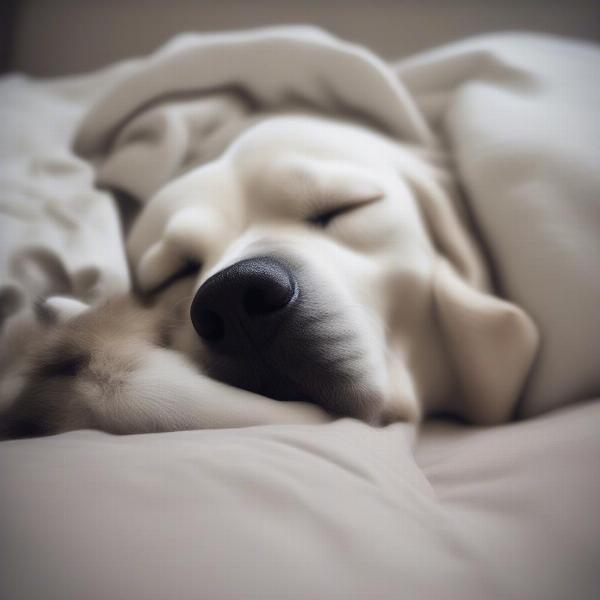Snoring in dogs is a common occurrence and can range from a gentle purr to a loud, rumbling sound. Understanding why your dog snores can help you determine if it’s a harmless quirk or a sign of a potential health issue. This article will delve into the common causes of snoring in dogs, offer tips for reducing snoring, and explain when it’s time to consult a veterinarian.
Common Causes of Dog Snoring
Several factors can contribute to snoring in dogs. Brachycephalic breeds, like Pugs, French Bulldogs, and Bulldogs, are more prone to snoring due to their short noses and narrowed airways. These breeds often have elongated soft palates that obstruct airflow, leading to the characteristic snorting and snoring sounds. Excess weight can also put pressure on the airways, making it difficult for dogs to breathe easily and contributing to snoring. Allergies, infections, and foreign objects lodged in the nasal passages can cause inflammation and congestion, which can also lead to snoring. Even sleeping position can play a role; dogs sleeping on their backs are more likely to snore.
Is My Dog’s Snoring a Problem?
 Dog sleeping soundly
Dog sleeping soundly
While occasional snoring can be harmless, persistent and loud snoring can indicate underlying health problems. If your dog’s snoring is accompanied by other symptoms like labored breathing, coughing, gagging, or restlessness during sleep, it’s essential to seek veterinary attention. These could be signs of more serious conditions like sleep apnea, respiratory infections, or heart problems. dogs breathe
Reducing Snoring in Dogs
If your dog’s snoring is not related to a medical condition, there are a few things you can do to reduce it. Maintaining a healthy weight through a balanced diet and regular exercise can significantly improve breathing. Changing your dog’s sleeping position can also make a difference. Encourage your dog to sleep on its side by using special pillows or bolsters. adult dog beds for humans Ensuring a clean and allergen-free environment can help reduce nasal congestion and improve airflow. Using a humidifier can also add moisture to the air, making breathing easier.
When to Consult a Veterinarian
If your dog suddenly starts snoring loudly, or if the snoring is accompanied by other symptoms like gasping for air, excessive daytime sleepiness, or changes in behavior, it’s crucial to consult your veterinarian. dog breathing hard while sleeping They can perform a thorough examination to diagnose any underlying medical conditions and recommend appropriate treatment.
Conclusion
Understanding why dogs snore allows owners to differentiate between normal snoring and potential health concerns. By recognizing the causes and implementing simple strategies, you can often reduce your dog’s snoring and ensure a restful night’s sleep for both of you. However, always consult a veterinarian if you have any concerns about your dog’s snoring or overall health.
FAQ
- Why does my dog snore so loudly? Loud snoring can be due to breed, weight, allergies, or underlying health issues.
- Is it normal for puppies to snore? Puppies can snore, but persistent snoring should be checked by a vet.
- Can allergies cause snoring in dogs? Yes, allergies can cause inflammation and congestion, leading to snoring.
- How can I stop my dog from snoring? Maintaining a healthy weight, changing sleeping position, and using a humidifier can help.
- When should I be concerned about my dog’s snoring? If snoring is accompanied by other breathing difficulties or changes in behavior, consult a vet.
- Do all brachycephalic breeds snore? While common in brachycephalic breeds, not all individuals will snore.
- Can a dog collar affect snoring? A tight collar can restrict airflow and potentially worsen snoring.
Related Articles
About ILM Dog
ILM Dog is your premier online resource for all things dog-related. We offer expert advice on dog breeds, health, training, nutrition, grooming, and much more. From puppy care to senior dog needs, we’re committed to helping you provide the best possible care for your furry friend. Our team of experts covers a wide range of topics, including breed selection, health and wellness, training and behavior, nutrition, grooming, and product recommendations. We strive to empower dog owners with the knowledge and resources they need to build strong, lasting bonds with their canine companions. For personalized advice or further information, please contact us at [email protected] or call us at +44 20-3965-8624.